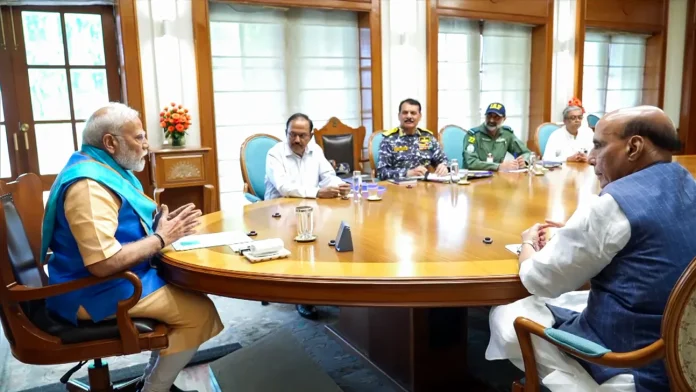NEW DELHI, May 10: In a significant escalation of its counter-terrorism posture, India has declared that any future act of terrorism will be treated as an “Act of War,” signaling a resolute shift in the country’s national security doctrine. This decision was made during a high-level security meeting chaired by Prime Minister Narendra Modi at his residence in New Delhi on Saturday.
The meeting, attended by Defence Minister Rajnath Singh, National Security Advisor Ajit Doval, Chief of Defence Staff General Anil Chauhan, the three service chiefs, and heads of the Intelligence Bureau (IB) and Research and Analysis Wing (RAW), reviewed the outcomes of the recent anti-terror operation ‘Operation Sindoor’ and assessed the current security scenario. Sources confirm that Modi’s firm stance on treating future terror strikes as acts of war was endorsed unanimously by the top brass.
The government’s declaration is seen as a stern warning to Pakistan against harboring or sponsoring cross-border terrorism. Officials emphasized that any such provocation could invite a swift and decisive response, similar in scale to the precision military strikes seen during Operation Sindoor.
Intelligence agencies briefed the security establishment on terrorists eliminated during the operation, including individuals linked to past high-profile attacks, such as the hijacking of Indian Airlines flight IC-814 in 1999. The operation, still ongoing, has dealt significant blows to terror infrastructure backed by Islamabad, even as Pakistan has shown little sign of de-escalation.
The Indian stance also finds ideological reinforcement in global human rights literature. The Council of Europe’s human rights manual draws parallels between terrorism and acts of war, citing the violence, political motivations, and devastating consequences both inflict on civilians.
International voices have also weighed in. Renowned U.S. security analyst Michael Rubin, speaking to NDTV, advocated for India to adopt a long-term, uncompromising strategy akin to Israel’s post-1972 Munich massacre response. Citing former Israeli PM Golda Meir’s policy of relentlessly hunting down perpetrators worldwide, Rubin urged India to similarly deter future attacks by pursuing justice globally, beyond borders and time limits.
Rubin noted, “India must remain relentless. Golda Meir and Mossad took more than seven years but sent a clear message: terror against our citizens will never go unanswered.”

